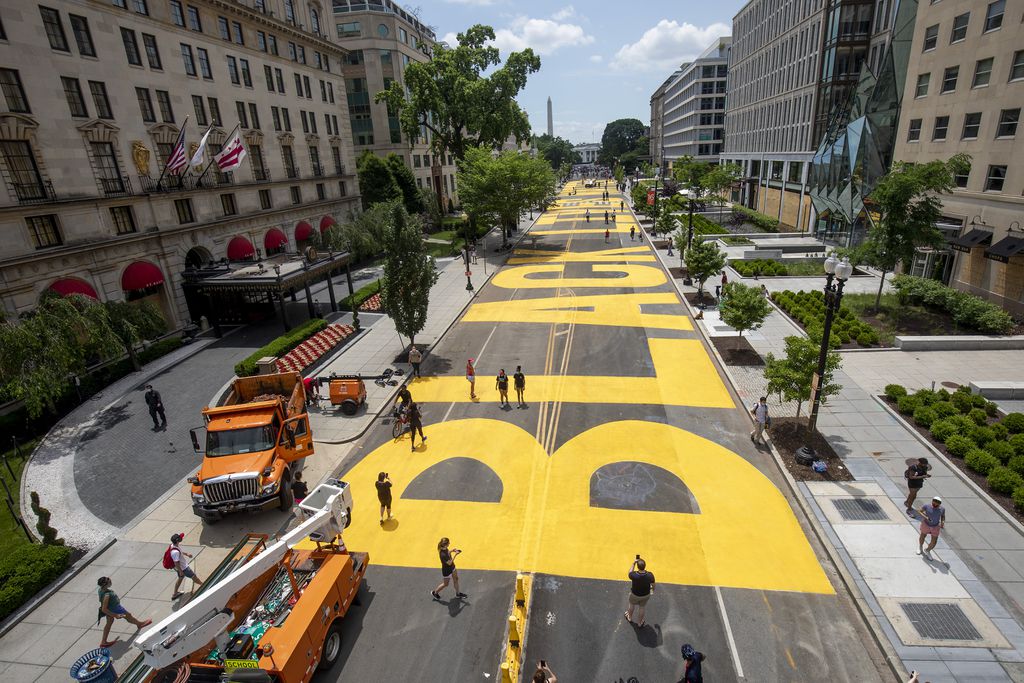brandi t. summers, ph.d.
professor ∙ researcher ∙ writer
race, urban infrastructure, aesthetics
race, urban infrastructure, aesthetics
⎯⎯Book⎯⎯
Reviews of Black in Place
J.S. Lewis, J. Robinson, A. Reese, M. Ramírez, B. Summers. 2021. “Book Review Symposium - ‘Black in Place: The Spatial Aesthetics of Race in a Post-Chocolate City.’” Antipode
O. Clerge. 2021. “Review of Black in Place: The Spatial Aesthetics of Race in a Post-Chocolate City.” Social Forces
B. Hinger & E. Quinn. 2020. “Black aesthetic emplacement: Thinking beyond neoliberal capitalist explanations of gentrification.” City
V. Brown. 2020. “Black in Place: The Spatial Aesthetics of a Post-Chocolate City.” Carolina Planning Journal
J. Perez Caro & B. Cheng. 2020. “Black in Place: The Spatial Aesthetics of a Post-Chocolate City.” Ethnic and Racial Studies
T. Kumfer. 2021. “Making and Unmaking a Chocolate City: Three Recent Works on Washington, D.C.” Journal of Urban History
L. Freeman. 2024. “Brandi Thompson Summers. Black in Place: The Spatial Aesthetics of Race in a Post-Chocolate City.“ American Historical Review
Black in Place: The Spatial Aesthetics of Race in a Post-Chocolate City (University of North Carolina Press)
While Washington, D.C. is still often referred to as “Chocolate City,” it has undergone significant demographic, political, and economic change in the last decade. In D.C., no place represents this shift better than H Street. Black in Place documents D.C.’s shift to a “post-chocolate” cosmopolitan metropolis by charting H Street’s economic and racial developments. The book focuses on the continuing significance of blackness in a place like D.C., how blackness contributes to our understanding of contemporary urbanization, and how it laid an important foundation for how Black people have been thought to exist in cities. Black in Place also analyzes how blackness—as a representation of diversity—is marketed to sell a progressive, “cool,” and authentic experience of being in and moving through an urban center.
Black in Place offers a theoretical framework for understanding how blackness is aestheticized and deployed to organize landscapes and raise capital. Using a mix of participant observation, visual and media analysis, interviews, and archival research, it shows how blackness has become a prized and lucrative aesthetic that often leaves out D.C.’s Black residents.
“Black in Place is a beautiful, critical, and searing narrative of displacement on H Street, the most heartbreaking and telling of all of the gentrification processes in the Chocolate City. Brandi Thompson Summers has written the book you need to read to understand how racism, capitalism, and power, material and symbolic, collide in the modern American city with constraining and calamitous outcomes for working class Black residents.”—Zandria F. Robinson, author of This Ain’t Chicago
“Sitting at the intersection of human geography, cultural studies, and Black studies, Black in Place brings new cutting edge perspectives to each of these fields. A both timely and important book.”—Rashad Shabazz, author of Spatializing Blackness
While Washington, D.C. is still often referred to as “Chocolate City,” it has undergone significant demographic, political, and economic change in the last decade. In D.C., no place represents this shift better than H Street. Black in Place documents D.C.’s shift to a “post-chocolate” cosmopolitan metropolis by charting H Street’s economic and racial developments. The book focuses on the continuing significance of blackness in a place like D.C., how blackness contributes to our understanding of contemporary urbanization, and how it laid an important foundation for how Black people have been thought to exist in cities. Black in Place also analyzes how blackness—as a representation of diversity—is marketed to sell a progressive, “cool,” and authentic experience of being in and moving through an urban center.
Black in Place offers a theoretical framework for understanding how blackness is aestheticized and deployed to organize landscapes and raise capital. Using a mix of participant observation, visual and media analysis, interviews, and archival research, it shows how blackness has become a prized and lucrative aesthetic that often leaves out D.C.’s Black residents.
☆ ☆ ☆ ☆ ☆
“Black in Place is a beautiful, critical, and searing narrative of displacement on H Street, the most heartbreaking and telling of all of the gentrification processes in the Chocolate City. Brandi Thompson Summers has written the book you need to read to understand how racism, capitalism, and power, material and symbolic, collide in the modern American city with constraining and calamitous outcomes for working class Black residents.”—Zandria F. Robinson, author of This Ain’t Chicago
“Sitting at the intersection of human geography, cultural studies, and Black studies, Black in Place brings new cutting edge perspectives to each of these fields. A both timely and important book.”—Rashad Shabazz, author of Spatializing Blackness
⎯⎯Research⎯⎯
Current and ongoing research projects
Oakland Echoes:
Reimagining and Reclaiming the Black City (under contract with
the University of California Press)
In Oakland, California, Black resistance has laid the foundation for movements and formations that reclaim space through public cultures, electoral and grassroots politics, and in the aesthetics of everyday life. Oakland Echoes: Reimagining and Reclaiming the Black City, explores and highlights the roots and routes of this resistance and reclamation, not only as a response to urban gentrification and related economic policies, but also as a quest to think about the past, present, and future of a Black city. Ultimately, the book argues that Black Oaklanders use a myriad of symbolic and material means – activism, consumption, recovery, escape, and adaptation – to reimagine and reclaim the Black city.
Oakland, like many other cities with large, but dwindling Black populations, has experienced a continuing legacy of destructive urban policies leveraged by federal, state, and local governments that forcefully evict economically disadvantaged communities, treating them as disposable, impoverished urban dwellers. The mobility of Black residents in Oakland, either by choice or force, resembles distinct patterns of re-segregation. Policy is what has driven the cyclical destruction of Black spaces, relying on the state to solve the problems they created. I’m ultimately asking, what does it mean for Black people to have the same experience over and over again? In other words, what does it mean for Black people to live through constant cycles of movement, containment, dispossession, and erasure? How can we imagine various forms of displacement and emplacement alongside the mechanisms (policies) that attempt to keep Black people in place? How can we recast what’s already been done in a new light? This project is asking us to view from a different perspective, a different lens, in order to consider what work is already being accomplished by the people who have been most affected. Oakland Echoes details the critical histories, conflicts, and struggles over how to use the city, who belongs to the city, and most importantly, who makes the city.
This book does not offer a seamless or neat history of Black Oakland. It resists the idea of presenting a positive/negative story about Black life here. Instead, I highlight the complex politics, identities, struggles, joys that have made it such a difficult place to write about. How does one hold together all of the contradictions and complexities that make this medium-sized, extraordinarily ordinary city survive?
In Oakland, California, Black resistance has laid the foundation for movements and formations that reclaim space through public cultures, electoral and grassroots politics, and in the aesthetics of everyday life. Oakland Echoes: Reimagining and Reclaiming the Black City, explores and highlights the roots and routes of this resistance and reclamation, not only as a response to urban gentrification and related economic policies, but also as a quest to think about the past, present, and future of a Black city. Ultimately, the book argues that Black Oaklanders use a myriad of symbolic and material means – activism, consumption, recovery, escape, and adaptation – to reimagine and reclaim the Black city.
Oakland, like many other cities with large, but dwindling Black populations, has experienced a continuing legacy of destructive urban policies leveraged by federal, state, and local governments that forcefully evict economically disadvantaged communities, treating them as disposable, impoverished urban dwellers. The mobility of Black residents in Oakland, either by choice or force, resembles distinct patterns of re-segregation. Policy is what has driven the cyclical destruction of Black spaces, relying on the state to solve the problems they created. I’m ultimately asking, what does it mean for Black people to have the same experience over and over again? In other words, what does it mean for Black people to live through constant cycles of movement, containment, dispossession, and erasure? How can we imagine various forms of displacement and emplacement alongside the mechanisms (policies) that attempt to keep Black people in place? How can we recast what’s already been done in a new light? This project is asking us to view from a different perspective, a different lens, in order to consider what work is already being accomplished by the people who have been most affected. Oakland Echoes details the critical histories, conflicts, and struggles over how to use the city, who belongs to the city, and most importantly, who makes the city.
This book does not offer a seamless or neat history of Black Oakland. It resists the idea of presenting a positive/negative story about Black life here. Instead, I highlight the complex politics, identities, struggles, joys that have made it such a difficult place to write about. How does one hold together all of the contradictions and complexities that make this medium-sized, extraordinarily ordinary city survive?
⎯⎯Publications⎯⎯
Selected academic articles, essays, and book chapters
Summers, Brandi T. and Moriah Ulinskas. 2025. “Archiving Oakland.” Places Journal, April.
Summers, Brandi T. and Juleon Robinson. 2025. “Black Geographies.” Pp. 159-170. In J. Winders and I. Ashutosh, eds. The Wiley Blackwell Companion to Cultural and Social Geography, Chichester, UK: John Wiley & Sons, Ltd.
Summers, Brandi T. 2024. “The Reparative Schematics of Housing in Zachary Levenson’s Delivery as Dispossession.” Critical Sociology 51(3): 601-604.
Summers, Brandi and Desiree Fields. 2024. “Speculative Urban Worldmaking: Meeting Financial Violence with a Politics of Collective Care,” Antipode 56(3): 821-840.
Summers, Brandi T. 2023. “Picturing the Textures of a Chocolate City.” Pp. 143-149. In G. Harris and A. Watson, eds. Evelyn Hofer: Eyes on the City, Delmonico Books/High Museum of Art.
Summers, Brandi. 2022. “Urban Phantasmagorias.” City 26(2-3): 191-198.
Summers, Brandi Thompson and Olalekan Jeyifous. 2022. “Apocryphal Gospel of Oakland: (Im)permanence, Improvisation, and Our Absurdist Future.” Perspecta 54: Yale Journal of Architecture.
Summers, Brandi. 2022. “Black Insurgent Aesthetics and the Public Imaginary,” Urban Geography 43(6): 837-847.
Summers, Brandi T. 2021. “Untimely Futures.” Places Journal, November 9.
Summers, Brandi T. 2021. “Aesthetic Activism and the Quest for Authenticity in a Time of Crisis.” Mediapolis: A Journal of Cities and Culture 6(3), June 14.
Summers, Brandi Thompson. 2021. “Race, Authenticity, and the Gentrified Aesthetics of Belonging.” Pp. 115-139. In C. Lindner and G. Sandoval, eds. Aesthetics of Gentrification: Seductive Spaces and Exclusive Communities in the Neoliberal City, Amsterdam University Press.
Summers, Brandi Thompson. 2021. “Reclaiming the Chocolate City: Soundscapes of Gentrification and Resistance in Washington, DC,” Environment and Planning D: Society and Space 39(1): 30-46.
Summers, Brandi Thompson and Kathryn Howell. 2019. “Fear and Loathing (of Others): Race, Class, and Contestation of Space in Washington, D.C.” International Journal of Urban and Regional Research 43(6): 1085-1105.
Summers, Brandi. 2017. “Race as Aesthetic: The Politics of Vision, Visibility, and Visuality in Vogue Italia’s ‘A Black Issue.’” QED: A Journal of GLBTQ Worldmaking 4(3): 81-108.
Summers, Brandi. 2019. “‘Housing is a Natural Right, Not a Privilege’: Anti-Gentrification Activism in a Chocolate City.” The Funambulist 22, March 4:12-14.
Summers, Brandi Thompson. 2019. “‘Haute (Ghetto) Mess’: Post-Racial Aesthetics and the Seduction of Blackness in High Fashion.” Pp. 245-263. In H. Gray, S. Banet-Weiser, and R. Mukherjee, eds. Racism Post-Race: Culture, Critique, and the Color Line. Durham, NC: Duke University Press.
⎯⎯Public Writing⎯⎯
Public scholarship and academic essays written for a general audience

“We Need Action to Accompany Art”
The Boston Globe (June 11, 2020)
This solicited op-ed offers a critical lens to view state-sanctioned public art as “black aesthetic emplacement.”
This solicited op-ed offers a critical lens to view state-sanctioned public art as “black aesthetic emplacement.”

“Race and the Quarantined City/What Black America Knows About Quarantine”
The New York Times (May 15, 2020)
This solicited op-ed discusses the long history of Black spatial containment and marginalization in the wake of the COVID-19 pandemic.
This solicited op-ed discusses the long history of Black spatial containment and marginalization in the wake of the COVID-19 pandemic.


Black Aesthetic/Aesthetic Black: Race, Space, and the
Possibilities of Becoming
Public Seminar (May 2018)
This solicited piece discusses the productivity of blackness, and the mutual constitution of “black aesthetics” and “blackness as an aesthetic.”
Public Seminar (May 2018)
This solicited piece discusses the productivity of blackness, and the mutual constitution of “black aesthetics” and “blackness as an aesthetic.”


“Black Lives Under Surveillance”
Public Books (December 2016)
A review essay on Simone Browne’s Dark Matters: On the Surveillance of Blackness and Keeanga-Yamhatta Taylor’s From #BlackLivesMatter to Black Liberation that draws connections between race, surveillance, and capitalism.
Public Books (December 2016)
A review essay on Simone Browne’s Dark Matters: On the Surveillance of Blackness and Keeanga-Yamhatta Taylor’s From #BlackLivesMatter to Black Liberation that draws connections between race, surveillance, and capitalism.